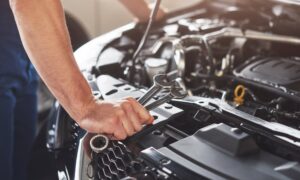
One of the most obvious signs of a failing muffler is an increase in noise. Mufflers are designed to reduce the loud sounds produced by your engine’s exhaust gases. When they become damaged or develop holes due to rust or impact, you may hear a loud rumbling, hissing, or roaring sound while driving. This noise tends to become more noticeable during acceleration. Ignoring this sign can not only lead to further damage but may also violate local noise ordinances.
Reduced Fuel Efficiency
An unexpected increase in your vehicle’s fuel consumption can often be traced back to a seemingly minor issue: a malfunctioning muffler. A compromised muffler can upset the delicate backpressure equilibrium within the exhaust system, impacting engine efficiency and the combustion process. This disruption forces the engine to exert more effort to generate the necessary power, consequently leading to a noticeable decline in fuel economy. Therefore, it’s essential to be vigilant about monitoring your gas mileage. Keeping a record of your fuel consumption habits allows you to detect subtle changes that might indicate an underlying problem with your muffler. Addressing this issue promptly can restore your vehicle’s optimal fuel efficiency and prevent further engine strain. The European Auto Repair in Puyallup, WA based service would be able to assist you there.
Bad Smells and Exhaust Fumes
The muffler also plays a critical role in directing exhaust fumes safely away from your vehicle. If it develops a leak or disconnects, exhaust gases may enter the cabin. This can expose you and your passengers to carbon monoxide, which is dangerous and potentially fatal in high concentrations. A strong smell of exhaust or fuel inside the car should be taken seriously and checked out immediately by a professional.
Rust or Visible Damage
Routine inspections of your muffler and the exhaust system can reveal signs of wear before they cause major issues. Look for visible rust, cracks, or holes in the muffler or pipes. Rust is particularly common in areas with heavy rain or road salt. While surface rust isn’t always serious, deep corrosion that compromises the structure of the muffler can lead to leaks and poor performance. If you see parts hanging loosely or dragging, seek immediate repair.
Poor Engine Performance and Increased Emissions
A failing muffler can impact more than just sound—it can affect how your engine runs. You might notice sluggish acceleration, reduced power, or rough idling. Additionally, problems with the muffler may trigger your vehicle’s check engine light, especially if sensors detect issues with emissions control. Increased smoke from the tailpipe or a failed emissions test can also point to muffler troubles. Addressing these symptoms early can help restore your car’s performance and keep emissions in check.
Staying alert to these common symptoms of a failing muffler can help you act quickly and avoid bigger repair bills down the line. Regular maintenance and early intervention are key to keeping your vehicle running quietly, safely, and efficiently.






